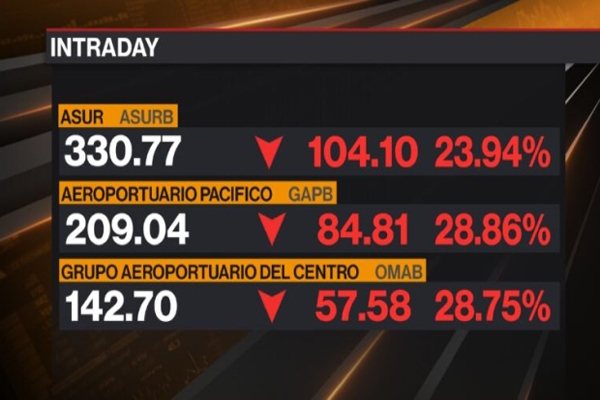- Airport shares slump most on record after surprise move
- Mexico stock index sheds 2.5% amid concerns of spillover

Michael O’Boyle, Ezra Fieser and Andrea Navarro, Bloomberg News
MEXICO CITY
EnergiesNet.com 10 05 2023
Mexico President Andres Manuel Lopez Obrador renewed his broadside challenge to the country’s business interests with an unexpected change to airports’ concessions agreements, sending stocks tumbling and adding pressure to the peso.
The benchmark stock index sank as much as 4.4% on Thursday, the most intraday since March 2020, in reaction to the surprise announcement, which companies didn’t detail and the government has yet to confirm. The peso fell 1.7%, the worst performance among emerging market currencies.
The changes will affect the entire tariff system, which includes passenger fees, airport services for use of runways and leasing spaces to airlines and suppliers, according to a person familiar with the matter. The companies are waiting to meet with the Infrastructure, Communications and Transport Ministry to understand the impact on operations as the paperwork the government sent wasn’t entirely clear, the person said, asking not to be named discussing private information.
The move adds further confusion to what has been a largely enigmatic approach to the business community by AMLO’s administration. On one hand, his tenure has been marked by a surge in foreign investment as US companies moved supply chains closer to home, which has helped fuel a record run for the country’s currency.
But he’s also at times angered private sector leaders with moves such as seizing a stretch of rail line owned by a billionaire businessman, ordering the cancellation of ongoing projects including an airport and a beer plant and increasing the state’s role in the aviation, mining and energy sectors.
Rodolfo Ramos, a strategist at BBI Bradesco, said the unclear move was raising concerns that other regulated sectors could see unexpected changes by the government.
“I think no one’s safe. We thought that airports were relatively better positioned than others,” he said. “This starts questioning rule of law and if the government is respecting contracts.”
Shares in Grupo Aeroportuario del Centro Norte SAB, or OMA, led stocks lower, tumbling as much as 44% before recovering some losses to close down 26% — a record tumble. Grupo Aeroportuario del Pacifico SAB, or GAP, dropped more than 22%, also the most ever since its 2006 listing. Grupo Aeroportuario del Sureste SAB, or Asur, lost nearly 17%. The benchmark index closed down 2.5%, at its lowest since early January.
Investors also sent other Mexican stocks down sharply. Toll road operator Promotora y Operadora de Infraestructura SAB and cement maker Cemex SAB both fell close to 5% while airline Volaris fell 3%.
The national aviation agency “unilaterally and without prior communication” modified the fee structure related to its airports, GAP said in a statement sent to the local regulator after-hours on Wednesday. A large part of airport operators’ revenue in Mexico come from so-called TUAs, or passenger fees for airport use.
GAP, Asur and OMA said in filings that they are evaluating the effect of the changes on their operations. A spokesman for the ministry didn’t reply to a request for comment.
Confrontational
Lopez Obrador, who has had a confrontational relationship with the aviation sector since coming to office in 2018, has upped government activity in the sector lately. The administration has recently announced the revival of state-run airline Mexicana de Aviacion and the transfer of the operations of the Benito Juarez International Airport to the Navy.
In August, the president railed against the high profits of airport groups but said he wouldn’t touch concessions. “Do you know how much they make?,” he asked at his daily press conference on Aug. 10.
“Fifty percent per year! We respect the agreements, and that is why we are not modifying those concessions, but we can no longer continue with that policy. The government must be to serve the people, not to be a committee serving a minority,” Lopez Obrador said at the time.
GAP, which is owned by Mexican companies Pal Aeropuertos and Promotora Aeronautica del Pacifico, has the concession for a dozen airports, including some of the country’s most prominent tourist destinations, like Los Cabos, according to its website.
OMA operates airports in central and northern Mexico, including the hub in Monterrey. Last year, French construction company Vinci SA bought a 30% stake in the company. Its peer Asur, which operates the Cancun airport as well as terminals in Colombia and Puerto Rico, is controlled by billionaire Fernando Chico Pardo, who also serves as chairman of its board.
–With assistance from Max de Haldevang and Davison Santana.
bloomberg.com 10 05 2023












